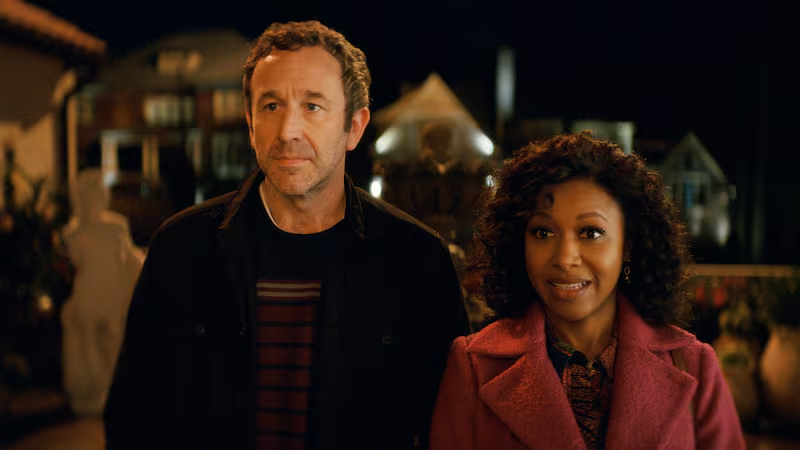When we last left the residents of Deerfield, the fictional Midwest town at the center of the strange occurrences in The Big Door Prize, everyone was zapped of energy—in some cases, quite literally. The Season 1 finale of Apple TV+’s existential comedy ended with a key character in the hospital after being electrocuted while trying to destroy a MORPHO machine, a photo booth-like contraption that tells you your life’s true potential. The rest of Deerfield’s population is just as exhausted (though, luckily, not under medical care) after spending the show’s first season comically upending their comfortable lives because the mysterious MORPHO spat out a little blue card with one vague word printed on it.
The results of this small-town chaos yielded one of 2023’s most unexpectedly delightful new series, which had much more to say about adult life and the nuances of our neuroses than a certain sickeningly upbeat Apple TV+ show. Quirky Deerfield dwellers like Dusty (Chris O’Dowd), his plucky wife Cass (Gabrielle Dennis), Cass’ arrogant mother Izzy (Crystal R. Fox), and toupéed restaurateur Giorgio (Josh Segarra) struggled to understand what their MORPHO cards meant, often finding that one word could conjure endless potential outcomes. These bite-sized, intertwining character studies were a novel joy, albeit one that had limits. Even though last season’s finale packed more than a few twists, repeating the same storytelling pattern would create viewer fatigue fast. One can only watch so many scenes of self-discovery before a show starts dipping into sickeningly saccharine Ted Lesso territory.
But The Big Door Prize was always smarter than most of its comedy contemporaries. Where Season 1 found unusual ways to balance its philosophical dissections of human life with intelligent, character-driven humor, Season 2—which premieres Apr. 24—expands its reach. The new batch of episodes brings Deerfield’s residents together after spending so much time solo, trying to figure out what their MORPHO cards meant. This season stresses the importance of community when we’re disoriented, and sharply dissects how humans use interpersonal relationships to grow alongside one another. It’s another blissful, perfectly paced 10 episodes that hit the hardest when you least expect them to, the kind of television that insists upon the intelligence of its viewer, rather than itself.
Season 2 finds the MORPHO needing a bit of juice. The machine stopped working after Mr. Johnson (Patrick Kerr), the now-hospitalized owner of the general store where the MORPHO randomly appeared, fiddled with it. This coincided with the revelation that Deerfield’s favorite bartender, Hana (Ally Maki), is more familiar with the machine than she originally let on. But though Hana’s had her own troubled experience with the MORPHO, even she doesn’t understand what the apparatus’ cryptic message, “Are you ready for the next stage?” could mean when the words flash across its plasma screen.

Chris O’Dowd and Gabrielle Dennis
Apple TV+As it turns out, the next stage trades life potentials with arcane visions, splayed out on the MORPHO’s screen like 32-bit video games. Each Deerfield resident gets their own image, complete with a lookalike avatar whose actions remain a mystery to everyone but the person they’re intended for. Dusty thinks that his vision is a confirmation of his and Cass’ decision to spend some time apart from their marriage, while Cass believes her vision affirms she needs to sever ties with her mother, Izzy.
Every citizen of Deerfield receives a vision that, in some way, encourages movement or reflection within their personal relationships. While individuality and the question of fate versus choice permeated Season 1, this new season looks outward. Do the people in our orbit hold us back, keep us stagnant and comfortable, or propel us forward? It’s a tougher question to answer than one might expect. It’s hard enough as it is to contend with ourselves, and even more difficult to look around us to ascertain whether the people we surround ourselves with serve who we want to be.
It wouldn’t be possible for The Big Door Prize to answer these queries unless the show had carefully crafted the microscopic eccentricities of its characters. Now that viewers are intimately familiar with everyone in Deerfield, watching them try to understand their mystifying visions proves even more compelling than Season 1’s graceful stage-setting. In a show that was already well-paced, with—praise God!—episodes that barely passed the 30-minute mark, the tempo of each Episode in Season 2 is even tighter. Exposition is largely out the door, but anyone fuzzy on the details from last season will be reminded, thanks to cleverly written jokes and callbacks that fit snugly into this season’s narrative.

Mary Holland and Josh Segarra
Apple TV+As much as the show might be a comfort watch far less grating than your average binge-able slop, it has stakes and edge too, fashioned with the same truth and introspection that the series’ more relatable quandaries all have. The Big Door Prize doesn’t balk at exploring hard realities, and the show is all the better for it. Dusty and Cass’ marriage is still joyful and filled with love, but the MORPHO’s meddling has reminded them of desires long-buried, and of goals left unmet. Their story, which once again provides the season’s emotional through-line, nimbly documents the work that any couple at an impasse of passion must do—a rare sight in television, where dramatic will-they, won’t-they tension is implemented to hold a viewer’s interest.
The Big Door Prize’s unassuming storytelling is its best asset. It exists in a middle ground, uninterested in pursuing the emotional highs and lows that most series live inside, because its writers understand that there is just as much tension and intensity in the murky center of our souls. Episodes are planted firmly in places we’re too afraid to go, and feelings we’re too fearful to explore, exploding these hidden things before our eyes. What’s more, the show finds humor in all of it, knowing it’s impossible to live without laughing at ourselves. How a show can be so luminous, yet so underrated, remains a mystery to me. Maybe The Big Door Prize’s destiny will be to remain flying painfully under the radar, found by viewers when they need it the most, much like our dear Deerfield residents and their mystical MORPHO.






